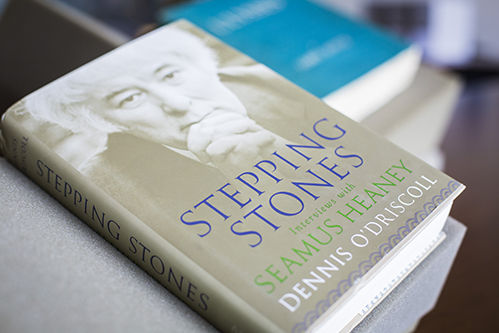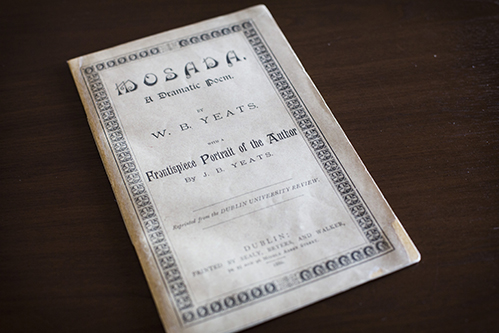Recent acquisitions and lectures by distinguished scholars have added more depth and visibility to the Stuart A. Rose Manuscript, Archives, and Rare Book Library, which holds one of the strongest Irish literary collections

Irish poet Dennis O’Driscoll is known for “Stepping Stones,” his series of interviews with Seamus Heaney. Image from the Rose Library collections at Emory University.
outside of Ireland.
Building on the strengths of the Seamus Heaney collection, the Rose Library has acquired the papers of poet Dennis O’Driscoll and historian Roy Foster. O’Driscoll, perhaps best known for his extraordinary series of interviews with Seamus Heaney that became “Stepping Stones” (2008), published nine books of poetry, three chapbooks and a collection of essays and reviews.
“O’Driscoll’s newly acquired papers immeasurably enrich the Rose Library’s Seamus Heaney collection, as well as the literary village of Irish poets, novelists and critics in Emory’s archives,” says Geraldine Higgins, associate professor of English and director of Irish Studies at Emory. O’Driscoll’s papers join those of Rita Ann Higgins, Edna O’Brien, Paul Muldoon and many others.
Seamus Heaney counted O’Driscoll as one of his closest associates. “Dennis was beloved by his friends for his originality as a poet, his acuity as a critic, his probity and courage and merriment as a man,” Heaney said after O’Driscoll’s sudden death in 2012. (Heaney died a year later.)
In the archives of Roy Foster, scholars will find material produced over a long career that has profoundly reshaped the study of Irish history, especially his critically acclaimed, two-volume biography of W. B. Yeats. Other notable works include biographies of Lord Randolph Churchill and Charles Stewart Parnell; “Vivid Faces: The Revolutionary Generation in Ireland, 1890-1923”; “Modern Ireland 1600-1972”; and “Paddy & Mr. Punch: Connections in Irish and English History.”
Foster influenced the Irish historical imaginations by expanding both the public and popular perceptions of the past, commented award-winning Irish writer Colm Tóibín during his November visit to Emory to deliver the 2017 Richard Ellmann Lectures in Modern Literature.

Rose Library also recently acquired “Mosada,” the first play by W.B. Yeats. Image from the Rose Library collections at Emory University.
Other notable acquisitions to the Rose Library include the first play by W.B. Yeats, “Mosada,” and a first American edition of “Pomes Penyeach” by James Joyce. Only 20 known copies of the Yeats play still exist from an original printing of less than 100, and this one has a personal inscription from Yeats to a school friend. To secure the American copyright for the Joyce poems, 50 copies of this 1931 edition were printed in the U.S. The 13 poems are arranged chronologically on 17 pages in this slim volume, with each poem accompanied by the date and location of its composition over a 20-year period.
“There is no doubt that the histories of Irish poetry from Yeats to Heaney will be based on the numerous archives of Irish writers, north and south, in the Rose Library,” says Ronald Schuchard, Goodrich C. White Professor of English Emeritus.
One scholar who devoted many hours to the Rose Library special collections is Rand Brandes, Martin Luther Stevens Professor of English at Lenoir-Rhyne University. Brandes will return to Emory to give a lecture entitled “The Publishing Life of Seamus Heaney” on Thursday, Feb. 1, 2018 at 5 p.m. Brandes received both his MA and PhD in English from Emory University, where he first met Heaney and subsequently became the bibliographer for the Nobel Prize-winning poet.
The lecture is open to the public at no charge, and registration is requested at the online registration link. Please check the Emory Libraries News and Events page for upcoming details on poetry readings in late March with Rita Ann Higgins and in early April with Sinéad Morrissey.
Rose Library Director Rosemary Magee welcomes all “to visit and explore the bounty of the thriving Irish village at Emory. These significant additions to our materials deepen our commitment to collecting and connecting stories of human experience through literature and history.”
For media inquiries, contact:
- Holly Crenshaw
- Phone: 404-727-0211
- Email: holly [dot] crenshaw [at] emory [dot] edu
- Elaine Justice
- Phone: 404-727-0643
- Email: elaine [dot] justice [at] emory [dot] edu
